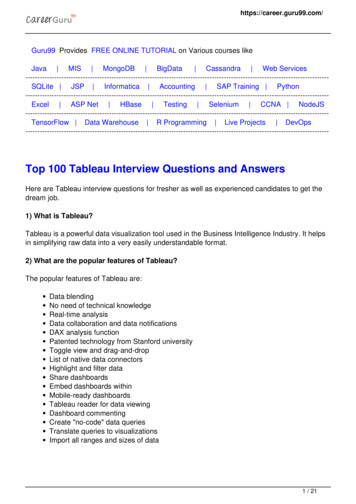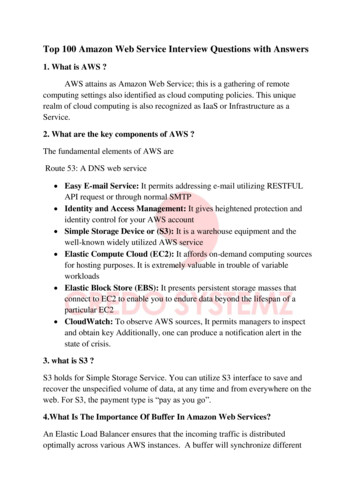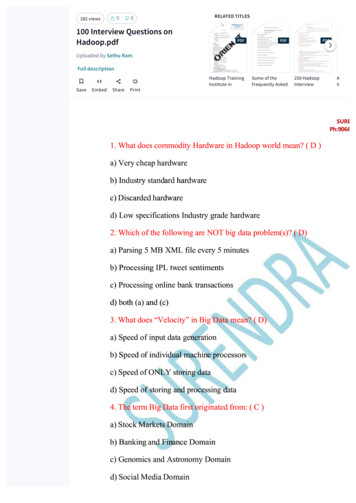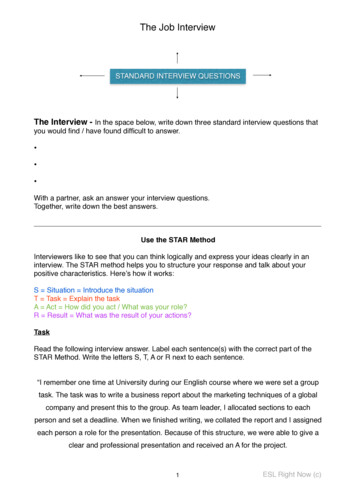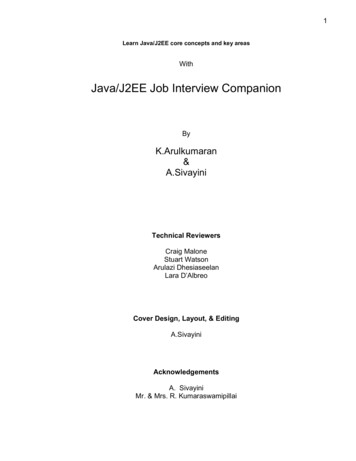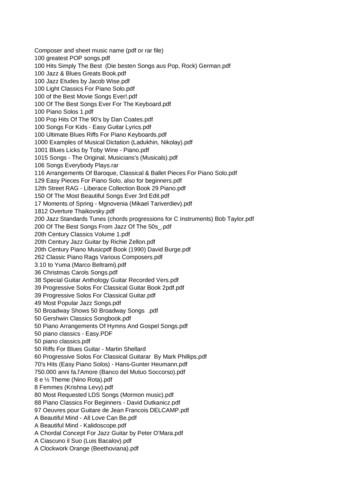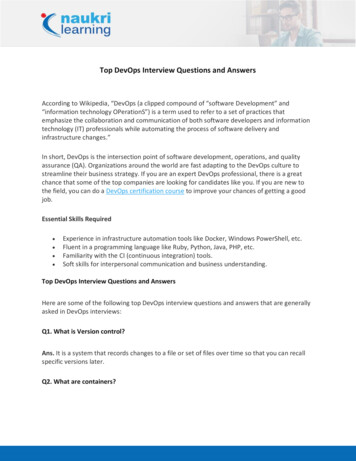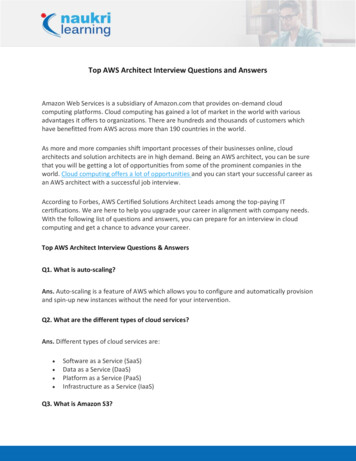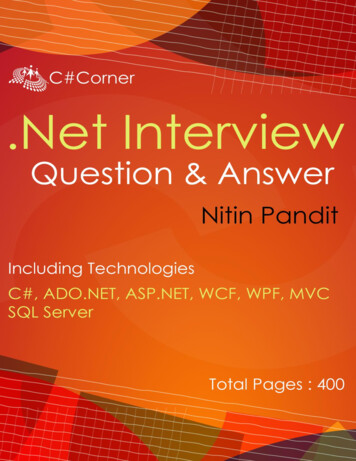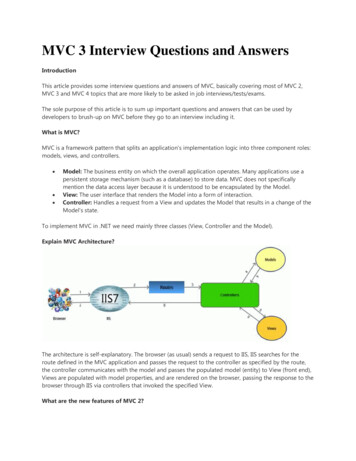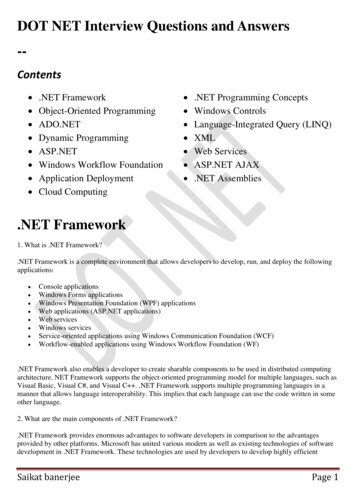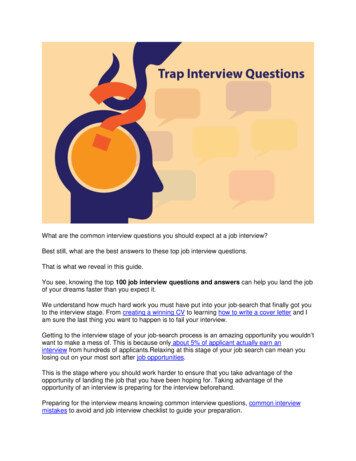
Transcription
What are the common interview questions you should expect at a job interview?Best still, what are the best answers to these top job interview questions.That is what we reveal in this guide.You see, knowing the top 100 job interview questions and answers can help you land the jobof your dreams faster than you expect it.We understand how much hard work you must have put into your job-search that finally got youto the interview stage. From creating a winning CV to learning how to write a cover letter and Iam sure the last thing you want to happen is to fail your interview.Getting to the interview stage of your job-search process is an amazing opportunity you wouldn’twant to make a mess of. This is because only about 5% of applicant actually earn aninterview from hundreds of applicants.Relaxing at this stage of your job search can mean youlosing out on your most sort after job opportunities.This is the stage where you should work harder to ensure that you take advantage of theopportunity of landing the job that you have been hoping for. Taking advantage of theopportunity of an interview is preparing for the interview beforehand.Preparing for the interview means knowing common interview questions, common interviewmistakes to avoid and job interview checklist to guide your preparation.
We have created this ultimate list of top 100 job interview questions and answers so that youcan practice before going for the interview. Knowing the top 100 interview questions andanswers will help you eliminate fear, and build your confidence during the interview that will helpyou become successful in your job interview and finally land your most sort after job.In this article, you would learn: How to answer behavioral interview questionsHow to answer panel interview questionsHow to answer competency based interview questionsHow to answer to brain teasersHow to answer traditional interview questionsHow to answer experience based interview questionsHow to answer opinion based interview questionsHow to answer trap interview questionsHow to answer salary interview questionsHow to answer communication interview questionsHow to answer hypothetical interview questionsTop 10 Common Interview Questions and Answers Tell me about yourselfWhat do you consider to be your strengthCan you tell us about your weaknessWhy are you leaving your current jobWhy should we hire youWhere do you see yourself in 5 yearsHave you ever been forced to resignWhat do you like the least about your current jobHow would you boss describe youGive me an example of an important goal which you had set in the past and tell meabout how you reached it.Ready?Let's dive in.How To Answer Basic Interview Questions and AnswersTraditional interview questions are questions that focus on your skills and value. This kind ofquestions are usually very descriptive. It gives the interviewer an idea of who you are, and howyou fit into the role and company at large.
1. “Tell me about yourself”?This is one question that you are sure that you will likely be asked regardless of the position thatyou are applying for. This question can take different forms like; can I meet you? Who are you?Can we know you? You don’t need to be confused they all mean the same thing.As simple as the question looks, it could also be very tricky. Be careful not to give unnecessarypersonal details about yourself. All the recruiter wants to know is who you are and how you fitinto the role and the company’s vision and work environment.Be careful to frame your response around what makes you the best fit for the role. You might betempted to talk about all the good stuff, but you will need to keep it concise and relevant.These statements will guide your response to the question; Talk about who you are professionallyHighlight your competenciesTalk about why you are hereFor instance, if you are applying for the role of a customer service manager, then you cananswer the question in response to the statements above;Sample Answer“I am an innovative customer service manager with 6 years of experience managing andmonitoring all the aspect of the customer service function-from solving customer’s problems toensuring customer retention to increasing sales. (Who you are)I have spent 6 years developing my skills as a customer service manager. I have been able toattract recognition and several awards even national awards 3 times. I love solving customerproblems and overseeing my team members do so too. (Competence highlights)Even if I love my current position, I know that I am ready to take up a more challenging role incustomer service, and that is why I am very excited about this position. (Why you are here)”You can see that the answer responded to the three statements that we made earlier. You canuse the statements to frame your own answer too.Never give this kind of answer;“My name is Daniel Peters, I am from Delta state, and I attended St. Johns primary school afterwhich I went to Methodist Boys School. After my secondary education, I gained admission intothe University of Lagos. I am from a family of 6, my parents are very poor, and so I need this jobso that I can take care of my siblings ”.2. What are your strengths?
This question could be really confusing and hard to crack most times because you are asked totalk about your strong points. It is quite normal for you to feel awkward talking about yourstrengths without bragging.Well, to answer this question effectively, you will have to follow some of this formula; Assess your hard skillsAssess your transferable skillsAssess your personal traitsWhen you are assessing these skills, make sure they are closely related and relevant to theposition that you are applying for. When you are answering this question, try and stay awayfrom personal qualities and concentrate more on professional traits.As simple as the question looks, it is also very possible for you to mess the whole interview upespecially if you have not taken out the time to discover yourself to know your strengths, andhow to properly communicate them to the recruiter.You should also be able to accurately choose strengths that will help you perform the task well ifyou are offered the job. It means that you should not have a one fits all answer to this question.When answering this question, remember that the recruiter is looking for a good fit, and at thesame time trying to form a picture of you based on your response, and make sure yourstrengths are real strengths that will add value to the company. See sample answer to helpframe your answer;Sample AnswerIf you are applying for the position of a customer service manager, this is what your responsewill look like:“My strength is my patience to solving problems (Assess your hard skills).My current position as a customer service manager, I was patient (Personal trait) enough toturn a toxic work environment to a positive one, and created a motivating environment whereeveryone can work comfortably.I also feel that my communication skills (transferable skills) are top-level because I relate withsenior executives on the same basis that I relate with junior staff members.”This answers the question well to a large extent because the answer highlights the strengthsthat are relevant to that particular position. The candidate did not give a well-rehearsed answerbut also gave a real-life instance that makes it more detailed.3. Can tell us about your weaknesses?
This may sound like the trickiest question that a recruiter can ever ask. It may feel reallyawkward for you to talk about your weakness during a job interview when you are supposed tobe pitching yourself.The confusing part of the whole question is how to actually talk about your weakness, but notmaking it a big threat to the role that you are applying for.When recruiters’ ask this question, they are not very much concerned about the answer, butthey are more concerned about how you answer the question. Many candidates tend to lieabout their weaknesses, it is not advisable for you to lie about your weakness even if you shouldput it in a subtle manner.When you are answering questions about your weakness, you should be careful not to givecliché answers that are not close to being your weakness at all. Answers like “my greatestweakness is that I am so much of a perfectionist, I love everything to be organized andorderly at all the time.”This answer looks perfect, but this is a common cliché that sounds really unrealistic and doesn’treflect a true weakness at all. This statement will guide you to answer this question well: Be self-aware: To answer this question well, you have to be self-aware to recognizeyour real weakness. Be careful when choosing a weakness so that it does not affect yougetting the job.Be truthful: As much as you want to give a piece of information that will not affect thejob, you should also be sure that you are talking about a real weakness.Self-improvement/recovery: After telling the recruiter about your weakness, you shouldalso state the effort that you are putting in to manage the weakness that you stated.Sample AnswersSample 1“I am really impatient working in a team (self-awareness)-I love to work independently and so itis difficult for me to rely on others to complete a task. That is why I have pursued a position thatmakes it possible for me to work independently (be truthful). However, I have also worked toimprove this weakness by enrolling in team building workshops. While I work independently, it isimportant I learn how to trust my co-workers better.” (Self-improvement/recovery).Sample 2"Public speaking makes me really nervous (self-awareness). Even if I don’t have to do too muchof public in my role as a graphic designer, I nonetheless feel it is an important skill I have to getused when communicating with others. (Truthful)To overcome the fright, I spoke to my manager that I would love to give the introductory speechduring our team meetings. This has allowed me to be less nervous speaking to a group ofpeople and has also helped me communicate better with team members to do their jobseffectively. (Self -improvement/recovery)
This answer works well because the candidate mentions a real weakness that does not affectthe candidate’s ability to do the job. Secondly, the candidate shows the eagerness to developstrategies to tackle the weakness.4. Why are you leaving your current job?This is one question that can throw a job-seeker off the balance if the person is not veryprepared for the question. Many times job-seekers sincerely leave their current jobs becausethey want to get a better offer, but that is not what you will want to tell your prospectiveemployer.This question could be really tricky because you don’t want to say that you are leaving yourcurrent job because you want a better offer and sound like a “gold digger” that will still leave insearch for a better offer somewhere else.To tackle this question, you would need to give an answer that is closely related to you wantingto move forward in your career. No one would frown at anyone’s attempt to wanting to moveforward in their career. You have to be careful not to emit “negative vibes” when answering thequestion.You can take a look at these sample reasons that are easy to explain; Desire to improve work/life balance.Your wish to learnYour yearn to take on more responsibilityYour wish to take on less responsibilityWanting to relocateDesire for a career change.Desire for career growth and developmentNo longer interested in the company’s vision and goal.Desire for a shorter commute to work.Answering this question, you should not just throw the answer at the recruiter, you should taketime to and make sure you are giving the right answer to the question. You can use thisopportunity to talk about your interest in the new position that you are applying for and not talkdespairingly about your current employer.Don’t be negative about your current employer, rather you should focus on what the newposition will afford you (career wise). If you speak poorly of your boss during an interview, whatproof does the potential employer have that you wouldn’t say the same thing about them inanother environment?Always avoid answers that relate to compensation, company finance or poor management. Youshould always stay positive regardless.Sample Answers
“I have really learned a lot working with an amazing group of people in my current employment,but this opportunity fits very well with the direction I want to take in my career path.”“I have acquired great experience in my current job, but due to the size of the organizationgrowth is limited. So for me to continue to grow, I need to go somewhere else, and working inthis company will avail me the opportunity to grow in my career.”Remember to be positive and frame your answers around the organization you wish to work for.5. Why should we hire you?Most times when recruiters ask this question, job-seekers are mostly thrown out of balance.Most times it is like putting the job-seeker in the position of the recruiter. This question will makemany job-seekers ask themselves this question; “If I were the employer, why would I hiremyself?”Often times when recruiters ask “why should we hire you?” they indirectly want to know why youare the best fit for the job.As straight forward as the question may look, you still have to be very careful when answeringthe question. Don’t be in a hurry throw the answer back at the recruiter, you might end up givinga negative impression about yourself.You should always avoid answers like:“You should hire me because I know you urgently need someone to fill this position, andI think I can do the job”.It is very important for you to take your time to think of a concise and effective answer to thisquestion. Before you attempt to answer the question, you should know;a. Why recruiters ask why should we hire you?b. how to answer the questionc. The response to giveWhy recruiters ask “why should we hire you?”Job-seekers may feel that recruiters ask this question just to make them feel uncomfortable, butthat is not the case. Recruiters ask this question because they want to know why you are thebest fit for the job.Recruiters simply want to know how you fit into the position they are recruiting for.
How to answer the “why should I hire you question?”Since the whole interview boils down to this one question, then it is worth preparing for. Youshould always understand that the interviewer wants to know how you fit into the position. Makesure your response clearly states why you are the best person for the position.The best response to giveSince every hire is a risk to the recruiter, then you should be ready to prove to the recruiter that;a. You can perform the task excellentlyb. You will perfectly fit into the position and be a great addition to the teamc. You possess the right skills and experiences that makes you stand out from othercandidatesd. Hiring you will add a great deal of value to the company.Sample AnswersIf you are applying for a marketing role;“From your job advert, I understand that your company is looking for an experienced marketerthat will grow the business and help the company stand out from its competitors. At my previouscompany, I increased the sales by 30% within the space of one year by devising targeted socialmedia advertising strategy. I will definitely bring in that spirit of ownership and innovation to thiscompany if I am given the opportunity.”If you are applying for the role of a web developer;“I believe that my experience in technology, specifically in web design makes me the bestperson for this position. In my previous job, I was responsible for updating the company’swebsite. This required me to always make sure everything goes on well on the web page,update employee profile and ensure proper content upload on the site. I enjoyed the role, whichwas what attracted me to this company, I would love to bring in my skills to this position”.How to answer the question if you are a fresh graduate with no work experience:Getting your first job after graduation may not be as hard as you may think. It is true thatemployers are about getting the right talent to fill their positions, but being a fresh graduate isnot a disadvantage if you prepare well for the interview.If this question comes up in an interview, chances are it will be the only valuable opportunity foryou to prove that you are the best candidate for the job.Remember to stay away from answers that will remind the employer that you have noexperience and probably not a good fit. Answers like:“You know it is really hard to find a job especially when you have no experience, I don’t want tostay idle, and I want something that will keep me busy”
This kind of response doesn’t show the employer that you have a special interest in the job andthe company at all, and you have also succeeded in reminding the employer that you don’t haveany experience.Instead of answering like that, you can phrase your answer in such a way that it will show yourinterest in that particular position, your enthusiasm to be a part of the organization, your interestin learning and development, and your vision to contribute to the overall growth of the company.Your response should look like this:“I am a very driven and open-minded person that can really learn fast. During my volunteer witha local retail outlet, I discovered how much I enjoyed solving customers’ problems and renderingservice in general. Looking at the job description and what I have learned from the interview, Ithink this position will support my interest and will also give me the opportunity to contributepositively to the organization, and am very excited about this opportunity”.This kind of answer will give the employer an idea that you are passionate about the position,and a passionate person is someone that can learn fast. Every employer would love to hiresomeone with the right spirit.6. Where do you see yourself in 5 years?This is one question that employers use to trap you in a corner and you may not even recognizeit at all. Employers don’t just ask this question because they are really interested in what youwant to do with your life in 5 years’ time. Employers ask this question for two reasons:a. The employer wants to know how long you plan to stay in the position.b. The employer wants to know if your vision aligns with that of the company.As much as the employer want know your plan in the position and the company, it could betempting for you to pour out your sincere intentions, but saying it out like that may not be thebest approach to the question.This is the response that your mind will likely prompt you to give, and it is probably what theinterviewer doesn’t want to hear:a. Plans about how you would love to take the position of the hiring manager in 5years.b. Strategies about how you would be promoted in a few years.c. Your aspiration about owning your own business in a few yearsd. A straight “I don’t know”, “I don’t have any plans for the future, I just want a jobnow”I know you would be anxious to ask “then what does the recruiter want to hear?” You shouldnever forget that the business of a recruiter is that he wants to get the right candidate that wouldstay and grow in the position.
So when recruiters ask “where do you see yourself in 5 years” they simply want to know yourcareer goals within the position.The hiring manager is interested in knowing how satisfied you are with the position and thecompany and how hard and long you are willing to grow and stay in the company.Sample AnswersThis is how your answer should look like:“In 5 years, I would love to complete my internal and external training program for my position. Ihave read about it on your website, and I think it is an amazing opportunity for me to learn. Idon’t only look forward to getting the right training for my role, but it will quicken my journey tobecoming a m
That is what we reveal in this guide. You see, knowing the top 100 job interview questions and answers can help you land the job of your dreams faster than you expect it. We understand how much hard work you must have put into your job-search that finally got you to the interview stage.
